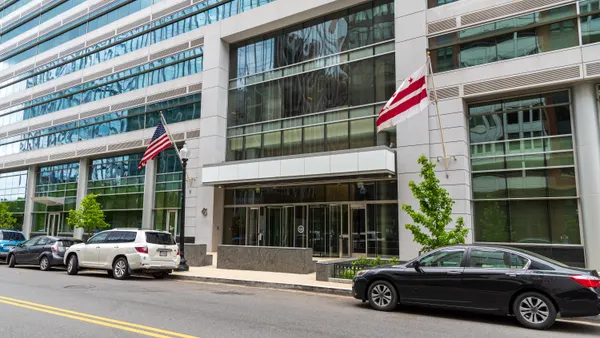Dive Brief:
- A majority of surveyed school districts — 96% — said the end of the federal pandemic waiver allowing universal school meals caused an increase in unpaid meal debt charges, according to a survey of 1,230 school districts from the School Nutrition Association, a nonprofit organization representing 50,000 school nutrition professionals nationwide.
- The total unpaid meal debt reported by 847 respondents was $19.2 million — though per-district meal debt can look very different, ranging between $15 to $1.7 million, SNA found. Of 846 respondents, nearly 98% of those that did not offer universal school meals had unpaid meal debt, compared to 33% of districts that did offer free meals to all students.
- The report said average daily participation in breakfast and lunch saw a noticeable drop between October 2021 and October 2022, with breakfast participation decreasing 10.8% while lunch dipped 5.7%. However, among programs that offered free meals to all students, breakfast participation increased 8.9% and lunch rose 6.4% during the same period.
Dive Insight:
The survey data from SNA shows a widespread link between the loss of the universal school meal waiver, growing meal debt and decreased participation in school meals.
The survey data from SNA also highlights the negative effects of discontinuing universal school meals, as districts that did not have universal meal policies saw lower average daily participation in breakfast (down 23.1%) and lunch (down 13.2%). A 2018 study from Georgia State University found that policies providing free meals to more students, such as the Community Eligibility Provision, can improve student health when these school meals are more accessible.
Meal debt can add more financial burden to a district if a student does not pay it off. Often, a district will have to offset the costs through its local funds when families cannot pay overdue balances.
Districts are also worried current meal reimbursement rates are not enough to keep pace with rising costs.
With the passage of the bipartisan Keep Kids Fed Act in 2022, Congress raised the reimbursement rates for school meals by 40 cents per lunch and 15 cents per breakfast. When the rates expire at the end of the 2022–23 school year, 99.2% of surveyed districts expressed moderate or serious concern about the sufficiency of those rates without the extra incentive from Congress.
SNA recommends Congress permanently continue the increased reimbursements established in the Keep Kids Fed Act in addition to offering all students free school meals.
But as the outlook wanes for federal leaders to implement another universal school meal policy, state legislators are beginning to propose their own legislation.














